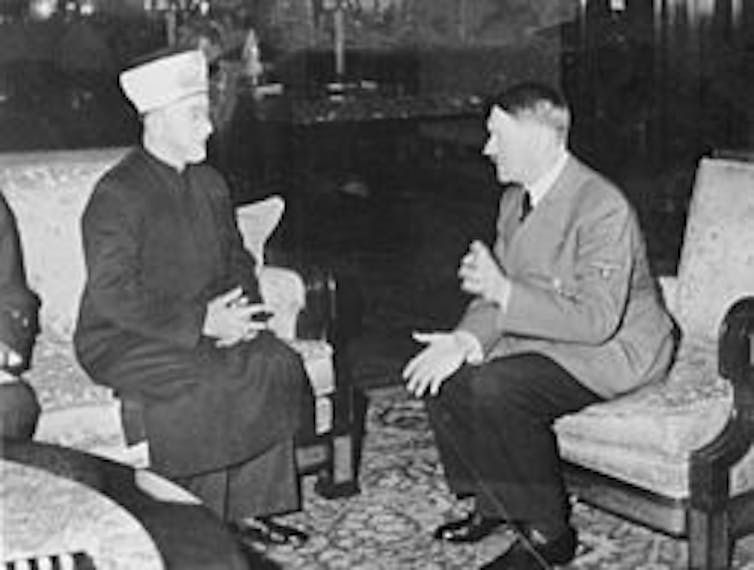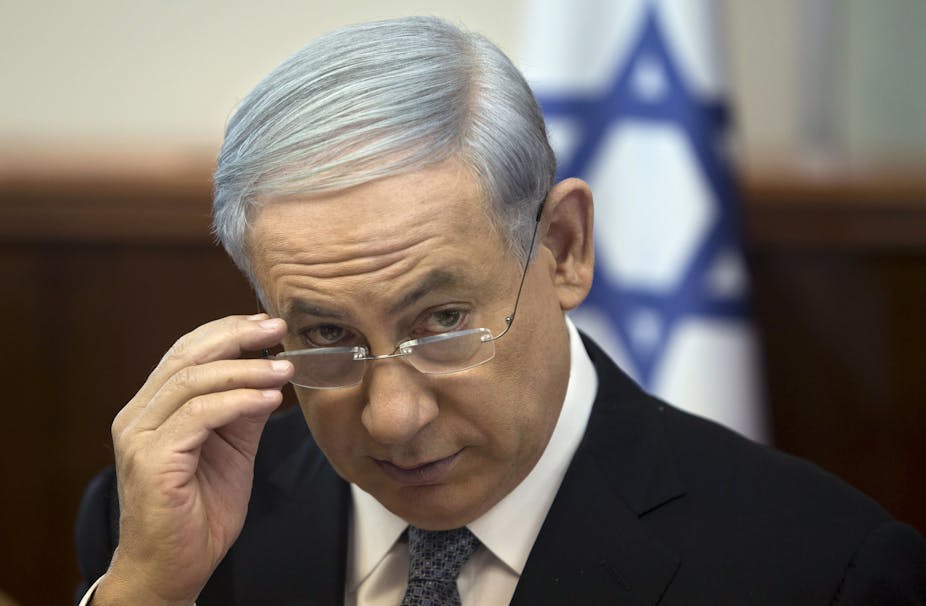What more can be said about Netanyahu’s flagrant Holocaust revisionism? Rainer Schultze summarised the incident nicely. By claiming the Palestinian mufti, Haj Amin al-Husseini, inspired Hitler to plan the Holocaust, Netanyahu was engaging in blatant historical revisionism for the sake of contemporary politics. It certainly is worth repeating Netanyahu’s claim:
Hitler didn’t want to exterminate the Jews at the time, he wanted to expel the Jews. And Haj Amin al-Husseini went to Hitler and said: ‘If you expel them, they’ll all come here.’ ‘So what should I do with them?’ he asked. He said: ‘Burn them.’
Recently there has been renewed activity in the project of accrediting this alternative historical narrative. Haaretz’s Chemi Shalev dug out a reference-laden article by Joseph Spoerl on the website of the Jerusalem Center for Public Affairs which attempts to link Husseini with Nazi ideology. Similar accounts have been published in Hebrew by right-leaning Israeli think tanks Mida, which defines itself as “conservative-liberal” and the Kedem Forum, an organisation specialising in public diplomacy.
Michael Sells has traced the narrative of the mufti as the progenitor of the idea of the Holocaust in an excellent academic article and demonstrated that the claim is baseless. Nevertheless, as commentators have pointed out, the script that assigns Palestinian blame for the Holocaust serves a political purpose. It re-narrates the history of the Holocaust as a product of a single Palestinian historical figure. In doing so, it feeds into older and more established myths.
Amalek the supervillain
In Jewish tradition, “Amalek” is an abstraction that refers to eternal enemies of the Jews. It comes from Exodus 17: “The Lord will be at war against the Amalekites from generation to generation.” As Jeffrey Goldberg demonstrated, the myth of Amalek is often mobilised to string the Palestinian into a history of judeophobic persecution “from generation to generation”. The evil mufti narrative makes the historical figure of the mufti an almost ahistorical and mythical personification of Amalek and the very spirit of Israeli historiography.
The mufti, Netanyahu explained in his speech, was around to instigate attacks in 1920, 1921 and 1929 – and, while Netanyahu did not mention the full charge sheet against the mufti, the mufti is usually also blamed for the flight of Jews from Arab countries following the establishment of the state of Israel, as Spoerl explained: “The mufti’s call for murder and ethnic cleansing would not fall on deaf ears. After 1948, 850,000 Jews were violently driven from Arab lands, stripped of their property and passports”.

While the meaning of the evil mufti narrative and its relation with existing myths and attitudes in Israeli and Jewish life is worthy of a discussion, what is also interesting is the interpretation some Netanyahu supporters have given to it after the fact, arguing that Netanyahu deliberately lied in order to bring the world’s attention to the little-known history of Palestinian complicity with the Nazis.
Elli Fischer wrote in the Times of Israel about: “The brilliance of Bibi’s big lie”, while Carolyne Glick wrote in her article in the Jerusalem Post that: “For most Westerners, this is the first they’ve heard of the fact that the Palestinians’ George Washington was a Nazi war criminal.”
Of course, casting Husseini as the “Palestinian George Washington” is almost as much a fabrication as the “big lie” itself. But the idea that Netanyahu made these false assertions in order to introduce audiences to their context, which is implicit in Jeffrey Herf’s account as well, who wrote that: “Netanayhu’s comments about Husseini’s lasting impact on Palestinian political culture are very much on the mark” (Netanyahu made no such comments, his accusation was direct: “he said 'burn them’”), is as revealing as the content of his claims.
There is a philosophical construct known as “Wittgenstein’s ladder”, which was popularised by the late Terry Pratchett as “lie-to-children”. It means that in order to get across a complicated idea, sometimes you need to use an explanation that is actually wrong but which helps a child – or anyone learning about anything complex – build an understanding of that issue.

This is the approach Netanyahu’s supporters have taken. Netanyahu has deliberately taken a public blow, knowingly telling a lie, in order to focus his audience in what he considers to be the larger truth of historical Palestinian complicity in the persecution of Jews. While this argument is advanced as a desperate defence over a pretty clear statement, it actually neatly frames Netanyahu’s recent approach to politics.
Lying to children
When asked by the BBC’s Lyse Doucet last week about the chances of renewing negotiations, Netanyahu responded:
Are we living in the same planet Lyse? … Right now, as we speak, we can meet I have no problem with that … I’m willing to meet him he’s not willing to meet me – and you ask me about the resumptions of negotiations. Come on, get with the programme.
The condescending attitude and the crystal clear platitude clash with his statements from the previous day, when he compared the pronouncements of Palestinian president, Mahmoud Abbas, to those of Islamic State. Having asserted his willingness to engage in negotiations Netanyahu tells Doucet: “These people don’t want negotiations and they’re inciting for violence, direct your questions to them.”
But how convincing is Netanyahu’s willingness to negotiate with Abbas? Especially given that the education minister, Naftali Bennett of the Jewish Home party, said that:
When we talk about two states – it gives them hope. The government isn’t talking about a Palestinian state and therefore what the prime minister says is his own opinion and is not the position of the government of Israel.
The tensions within the Israeli government, which is reliant on a parliamentary majority of one, are simply too great to allow for any real change of policy towards the Palestinians. This policy was reiterated by Netanyahu recently when he announced that: “We need to control all of the territory for the foreseeable future.”
What was that about wanting to talk? Just like Netanyahu’s latest announcement – a counter-terror app – it’s a trick.
As for the Holocaust revisionism itself, sadly, it is not. The incoming Israeli ambassador to the UK, Mark Regev, referred reporters inquiring about Netanyahu’s pronouncements concerning the mufti to a 1993 book that details the mufti’s relations with the Third Reich. Its author is Benjamin Netanyahu.

